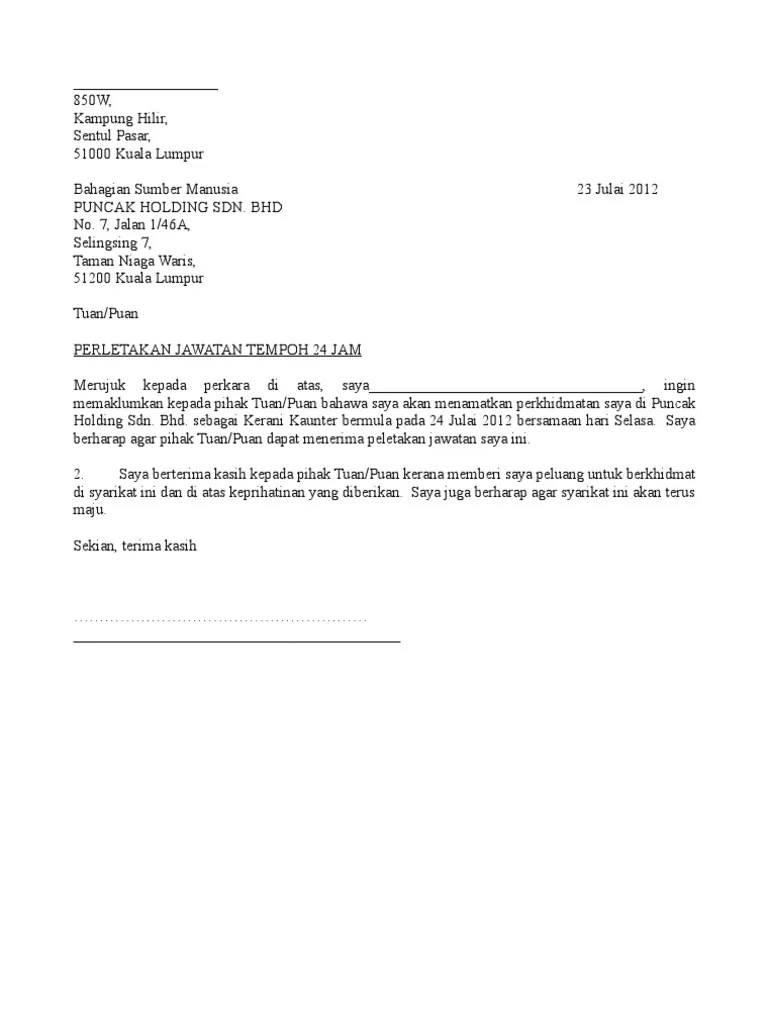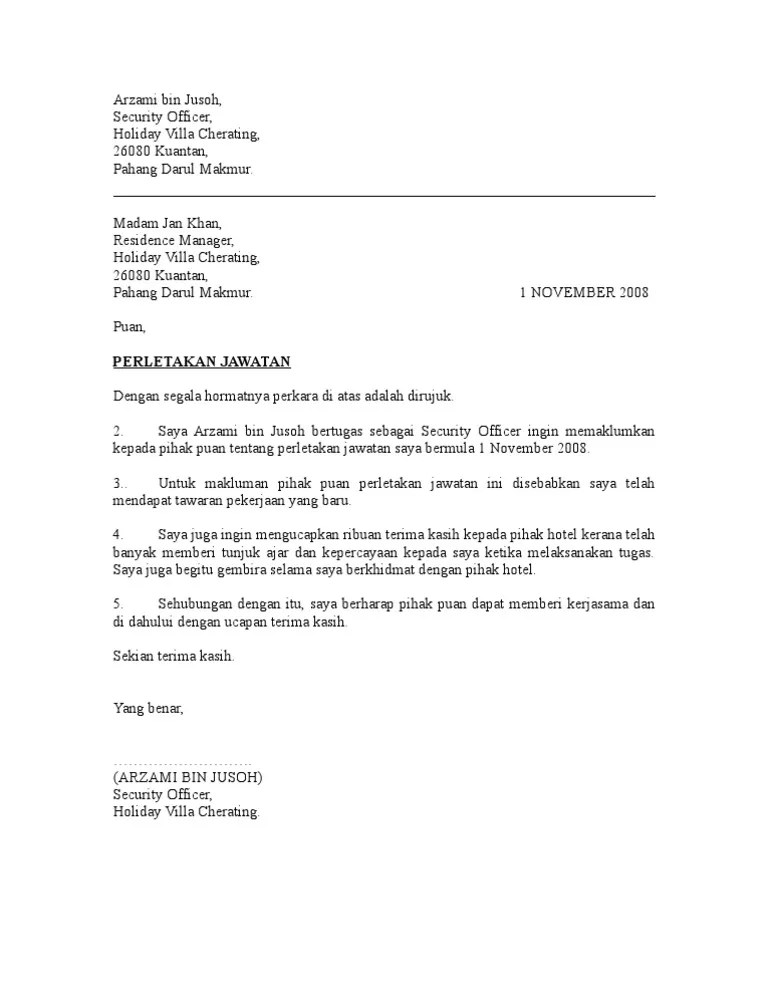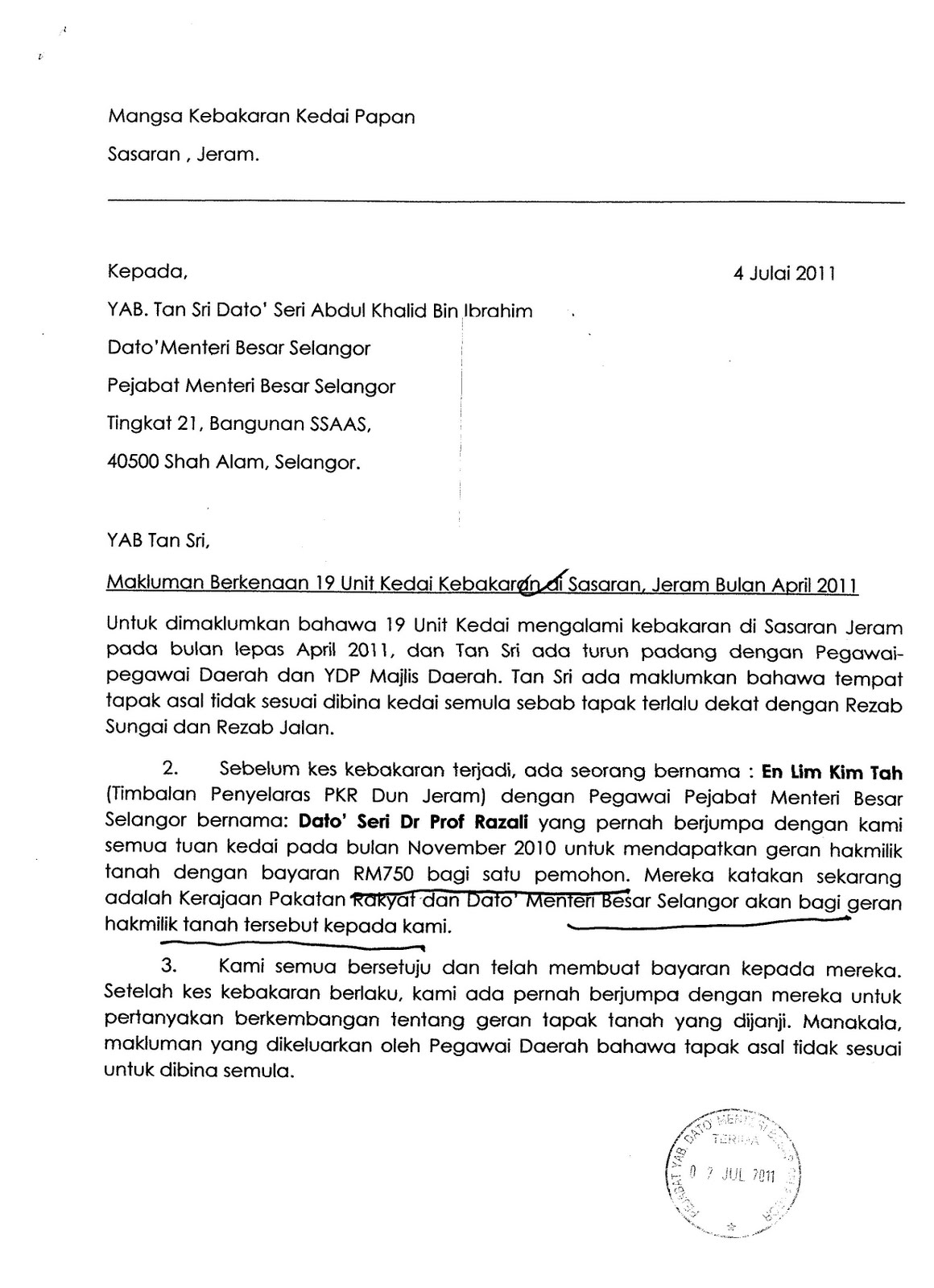Crafting Your Exit: Resignation Letters in Malaysia
Leaving a job can be a significant step, filled with a mix of emotions. One crucial element of this transition is the resignation letter, known as "contoh surat perletakan jawatan" in Malay. A well-crafted resignation letter is more than just a formality; it's a final professional statement that can leave a lasting impression.
In the Malaysian context, the contoh surat perletakan jawatan holds particular importance. It's a document that signifies your official notice of departure while maintaining respectful communication with your employer. This document allows for a smooth handover of responsibilities and ensures a positive ending to your employment relationship. Whether you're moving on to a new opportunity or pursuing other endeavors, understanding the nuances of a Malaysian resignation letter is essential.
The practice of formal resignation letters likely evolved alongside modern employment practices. As workplaces became more structured, the need for clear communication about leaving a position became evident. In Malaysia, the influence of both British administrative practices and local customs has shaped the standard format and expectations for these letters. Today, a well-written resignation letter is considered a professional courtesy and a vital step in the departure process.
One of the primary challenges in writing a resignation letter is finding the right balance between formality and sincerity. You want to convey your decision clearly and professionally without burning bridges. A poorly written letter could lead to misunderstandings, damaged professional relationships, or even legal complications. On the other hand, a well-written letter strengthens your professional reputation and ensures a smooth transition for both you and your employer.
A "contoh surat perletakan jawatan" typically includes a few key elements: your name and contact information, the date, the recipient's information, a clear statement of your resignation, your intended last day of employment, an expression of gratitude, and an offer to assist with the transition. While simple in structure, each element contributes to the overall professionalism of the letter. For example, clearly stating your last day of employment prevents confusion and allows your employer ample time to find a replacement. Expressing gratitude, even if you are leaving due to negative experiences, shows professionalism and leaves a positive final impression.
One benefit of using a template or "contoh" is that it provides a framework for structuring your letter. This can be particularly helpful if you are unsure about the appropriate format or wording. Examples can also offer guidance on how to express your intentions clearly and professionally. However, it's crucial to personalize any template you use to reflect your specific circumstances and maintain authenticity.
Another benefit is that a well-written resignation letter helps maintain a positive relationship with your former employer. This is especially important in a relatively interconnected professional world like Malaysia, where maintaining strong networks can be beneficial for future career prospects. A gracious exit can pave the way for positive references and future opportunities.
Finally, a well-crafted resignation letter provides a sense of closure. It formally marks the end of one chapter in your professional life and allows you to move forward with clarity and confidence. This closure can be beneficial for both your personal and professional well-being.
Advantages and Disadvantages of Formal Resignation Letters
| Advantages | Disadvantages |
|---|---|
| Provides a clear record of your resignation. | Can be time-consuming to write. |
| Demonstrates professionalism and courtesy. | May require revisions based on company policy. |
| Helps maintain a positive relationship with your employer. | Does not guarantee a positive response from your employer. |
Crafting an effective resignation letter requires careful consideration of your wording and tone. Ensure your language is respectful and professional, even if you are leaving due to dissatisfaction. Avoid negativity or blaming. Keep the letter concise and to the point, focusing on the essential information.
Frequently Asked Questions:
1. What is the standard notice period in Malaysia? (Answer: This depends on your employment contract, but it's commonly two weeks to one month.)
2. Can I resign verbally? (Answer: While possible, a written letter is always recommended for official documentation.)
3. What if my employer doesn't accept my resignation? (Answer: Your resignation is your decision, and your employer cannot force you to stay. However, refer to your employment contract for specific clauses related to resignation.)
4. Do I need to provide a reason for my resignation? (Answer: While not strictly required, providing a brief, professional reason can be helpful.)
5. What should I do after submitting my resignation letter? (Answer: Discuss the handover process with your supervisor and complete any outstanding tasks.)
6. Can I withdraw my resignation? (Answer: You can request to withdraw, but your employer is not obligated to accept.)
7. What if I'm asked to leave immediately after resigning? (Answer: Your rights and entitlements will depend on your employment contract.)
8. Where can I find sample resignation letters? (Answer: Many online resources offer examples of "contoh surat perletakan jawatan.")
In conclusion, writing a resignation letter, or "contoh surat perletakan jawatan," is a crucial step in leaving a job in Malaysia. It signifies your professional departure, facilitates a smooth transition, and maintains a positive relationship with your former employer. While seemingly a simple document, a well-crafted resignation letter reflects your professionalism and leaves a lasting positive impression. By understanding the key components, following best practices, and considering the potential challenges, you can ensure your departure is handled with grace and professionalism, setting the stage for a successful next chapter in your career. Take the time to craft your letter carefully, focusing on clarity, respect, and a positive tone. This effort will ultimately benefit both you and your former employer, ensuring a smooth and respectful conclusion to your professional relationship. This thoughtful approach to your resignation letter will contribute to your continued professional success in the future.
Electrify your commute the ultimate guide to finding used toyota rav4 hybrids near you
Finding serenity in houston red oak apartment living
Effortless style meets sustainable drive the toyota rav4 prime














